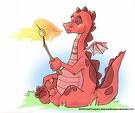
Community Interaction
Civilization within your world can be defined by the appearance of settled communities is a sign that a group of people. Communities show cooperation of large assemblages working together for the betterment of the whole.
In order to cooperate with one another, any collection of people -- whether settled or nomadic -- must hold a few things in common. Primary among them is language and common laws or customs.
Life takes a drastic change when people abandon hunting/gathering and settle down. Those changes may mean a complete overhaul of the tribe's customs, and this might be something which takes generations to work out. Life changes when people move from the farm to the city as well. If you have anyone going through this type of change, remember to consider the changes from one society to another.
One of the primary needs for a civilization is a way for the group to communicate with one another. It is not uncommon for certain phrases or gestures to be associated with a specific community with common cultural traditions. It seems the larger the group or community, the more sophisticated the language becomes to enable them to be specific and detailed.
When two groups interact, the lack of a common language can be the first step to disaster. However, remember that if two groups of people share a common border, they are also going to share some common words. Borders are usually made at natural physical barriers which stop the regular passage of people from one area to the next. However, streams and rivers are often crossable at either fords or at certain times of the year, and they do not confine language. This is especially true if you have established trade routes. Oceans, deserts, and mountains -- and entire star systems -- are better impediments, but except for the last one, they've all been overcome, and often in ancient times.
Nonetheless, under certain conditions, you can have two closely living groups with entirely different cultures and languages. One way might be in a large city where one group immigrates in and settles in a certain section, living apart from the earlier group. This has happened many times in our world and continues to happen today. But in a less modern world you can play with something unusual which would not be a barrier in a later age. For instance, there are two entirely different species of squirrels living on opposite sides of the Grand Canyon. Why not put something like this between your people? You can invent atypical reasons why your groups have different languages, cultures, etc. and still exist within close range of each other.
While I am addressing worldbuilding on a larger scale, as in a fantasy or sci-fi novel, these same principles can apply to worldbuilding in your fictitious town in our realm. Granted, communications differences may be more subtle, but there are often words or phrases that are specific to certain geographical areas. Sometimes these subtle idiosyncrasies can lead to openings for humor in your story or fuel the fires of conflict. Has anything like this transpired in your work?
Like this post? Tweet it! Go ahead, you know you want to!



























3 comments:
I sometimes have cliques of people in my small towns...people with different ideas on problems or how to approach them. Can be a good source of conflict.
Elizabeth
Mystery Writing is Murder
Food for thought then!
Related to this, it's worth taking a look at Papua New Guinea - a very tiny country with over 820 native languages...
Post a Comment